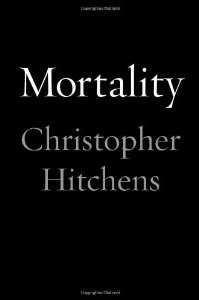Book Notes
 Christopher Hitchens, Mortality (New York: Twelve Books, 2012), 109pp.
Christopher Hitchens, Mortality (New York: Twelve Books, 2012), 109pp.
When Christopher Hitchens died after an eighteen -month battle with esophageal cancer in December 2011, the world lost one of its most colorful and controversial public intellectuals. I'll always remember attending one of his readings at a book store. There were obvious ironies: his father died of the same disease, speaking and writing were his very life, and as a chain-smoking alcoholic who admitted to long term denial about his self-destructive habits, he hastened the cause of his own death. In this posthumous volume, which is both philosophical and personal, Hitchens describes his last days with the grim reaper.
This book will only increase the cult of Hitchens — his encyclopedic intellect, literary eloquence, sharp and quick wit, zealous atheism, and controversial positions, like support for Bush's Iraq war or his book length diatribe against Mother Theresa. As you'd expect, there's no self-pity here, even though he admits that victimhood is a temptation. To the question, "Why me?' he says there's an easy answer: "Why not me?" Beyond this trademark bravado, there's also his brutal honesty about death and dying — feelings of impotence, oppression, resignation, unbearable physical pain, humiliation, and vulnerability.
In one chapter he calls the bluff of the cliche that "whatever doesn't kill me makes me stronger." That's a dangerous and pretentious illusion, he says. He meditates on the poetry of TS Eliot: "I have seen the moment of my greatness flicker, / And I have seen the eternal Footman hold my coat, and snicker; / and I am afraid." As for Philip Larkin's famous "Aubade," with its terrifying description of fear in the face of death, Hitchens describes it as an implied reproof of stoicism, and then concludes: "atheists ought not to be offering consolation either."
There's one tantalizing tidbit in the last chapter of unfinished random jottings: "If I convert it's because it's better that a believer dies than that an atheist does." This is left unexplained, and otherwise Hitchens remained atheistic to the end. His "chief consolation" was in friends, including very kind words for the outspoken Christian and famous geneticist Francis Collins. This final book by Hitchens reminded me of reading the biography of Steve Jobs. On the penultimate level of professional success, both were great and justly famous men. But on the personal level of ultimate issues, their deaths provoked in me many questions about what constitutes a good life. Much to his credit, that's probably just what Hitchens intended.


